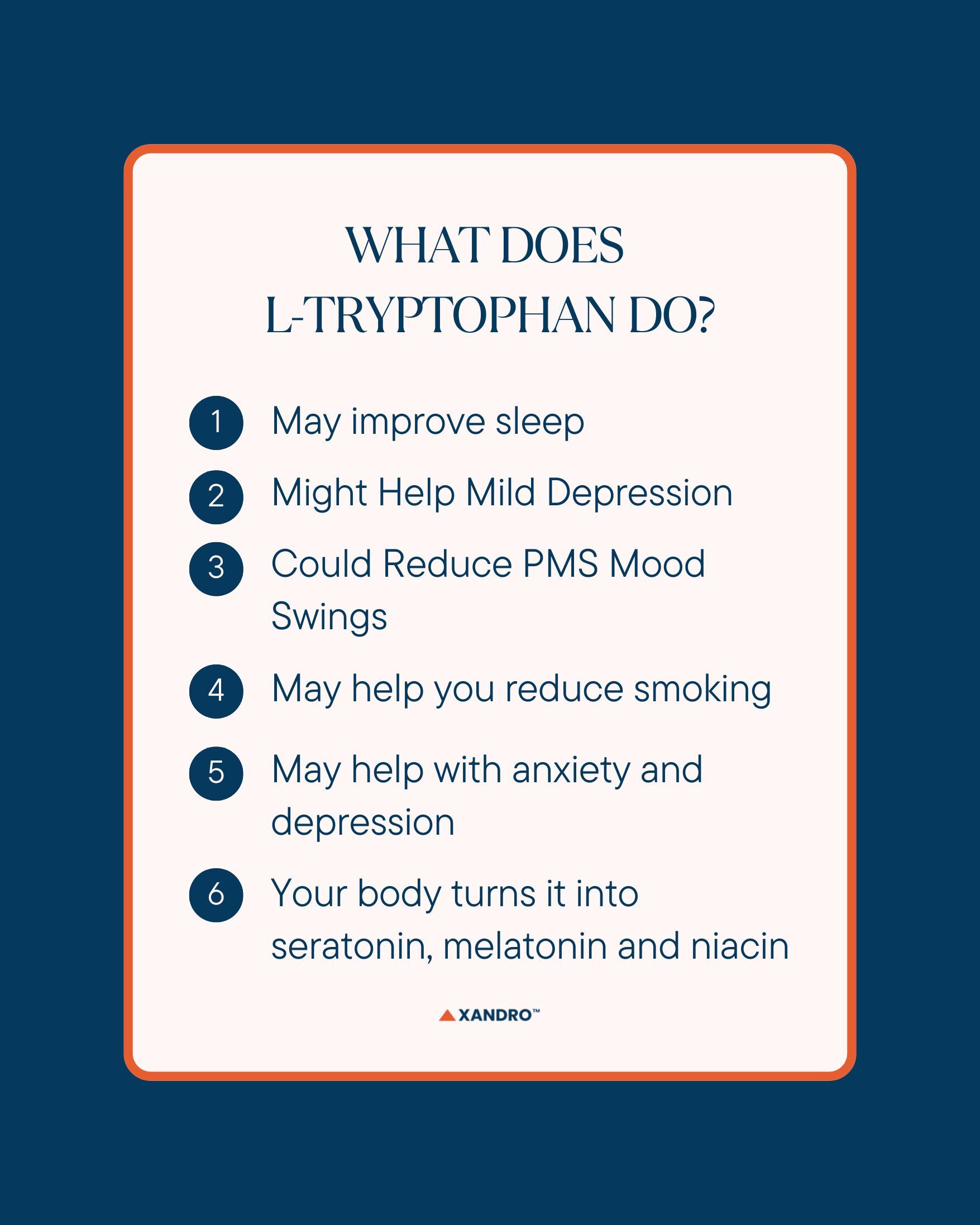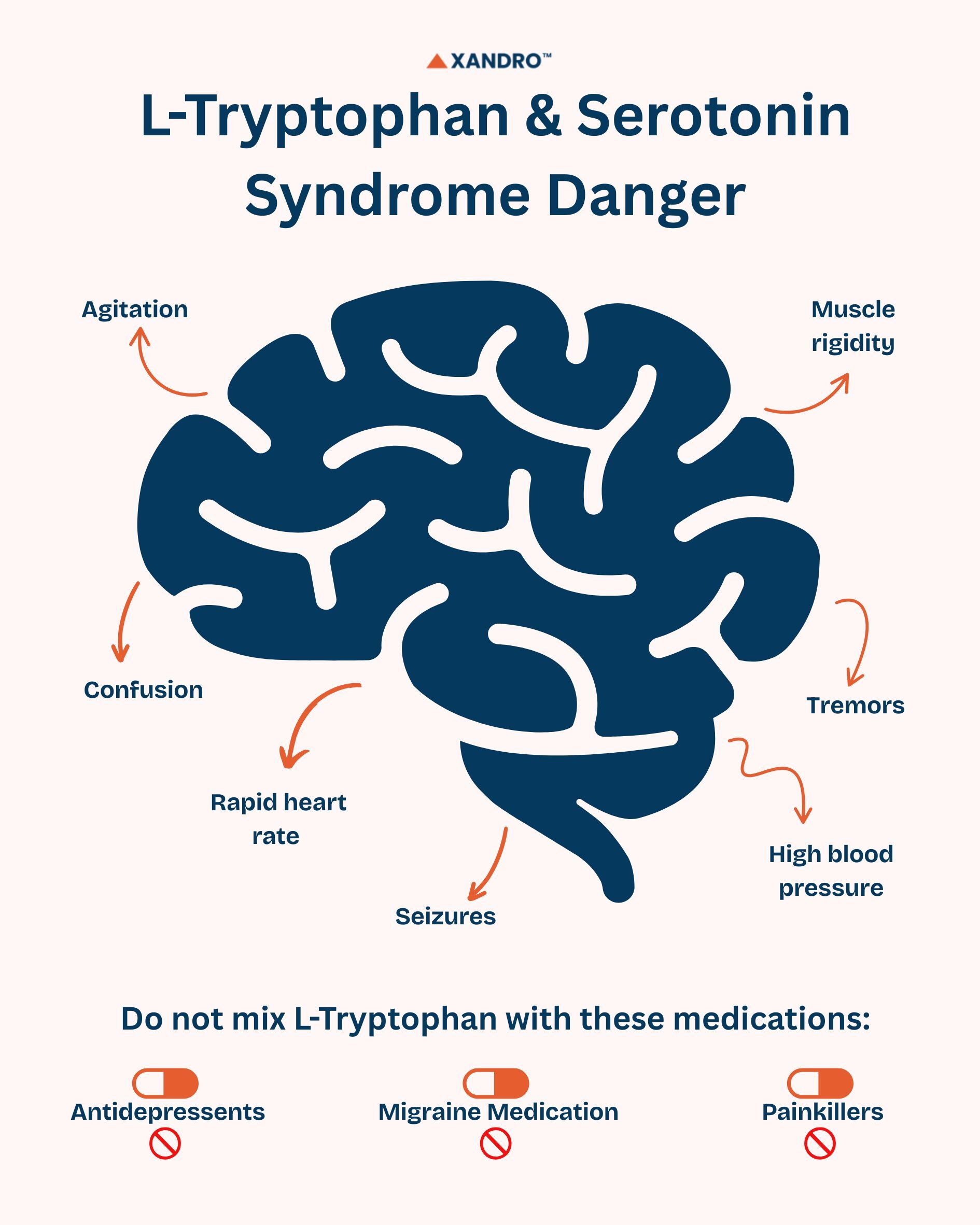L-Tryptophan Side Effects: Who Should Avoid It & Why?
6th May 2025
L-Tryptophan: Benefits, Side Effects and Who Should Avoid It
L-Tryptophan is an essential amino acid that plays a crucial role in mood, sleep, and overall brain function. While it’s naturally found in many foods, it’s also available as a supplement. But is it safe? Why was L-tryptophan banned in the past? And who should avoid it?
In this detailed guide, we’ll explore:
- What L-Tryptophan does
- The benefits of L-tryptophan supplements
- Potential side effects and risks
- Why L-tryptophan was banned in 1989
- Who should avoid tryptophan
- Foods rich in tryptophan
Products mentioned in this blog:
What Does L-Tryptophan Do?
L-Tryptophan is an essential amino acid. This means that your body can’t make it, so you need to get it from food or supplements. Once consumed, your body converts it into:
- Serotonin (the ‘feel-good’ hormone that regulates mood, sleep and appetite)
- Melatonin (a hormone that controls sleep-wake cycles)
- Niacin (Vitamin B3) (important for energy metabolism)
Because of its role in serotonin production, L-tryptophan is often used to support:
- Mood disorders (depression, anxiety)
- Sleep issues (insomnia, sleep apnoea)
- Premenstrual syndrome (PMS)
- Seasonal affective disorder (SAD)
It’s important to note, however, that while some studies suggest it has its benefits, the evidence is mixed, and L-tryptophan supplements may not work for everyone.
Further Reading: How NMN Can Help Boost Your Cellular Energy

L-Tryptophan Benefits: What’s Proven?
May Improve Sleep (But Evidence Is Mixed)
Some studies suggest 1g of L-tryptophan before bed may reduce time to fall asleep, but results vary. Melatonin and magnesium may be more reliable for insomnia.
Further Reading: Comparison of Magnesium Glycinate and Melatonin
Might Help Mild Depression (But Not a Standalone Treatment)
Since low serotonin is linked to depression, tryptophan could help, but it’s weaker than prescription antidepressants. It’s best used as a complementary therapy (under doctor supervision).
Could Reduce PMS Mood Swings
One study found that 6g of L-tryptophan per day helped with irritability and mood swings in severe PMS.
Further Reading: Taking Ashwagandha in the Mornings to Improve Mood
May Support Smoking Cessation (Early Research)
Some evidence suggests tryptophan reduces nicotine cravings, but more studies are needed.
What’s NOT Proven?
- Weight loss
- Muscle growth
- ADHD treatment
Does L-Tryptophan Have Side Effects?
While L-tryptophan from food is generally safe, supplements can cause side effects, especially in high doses or when combined with certain medications.
Common L-Tryptophan Side Effects
- Drowsiness and fatigue
- Nausea, vomiting, or diarrhea
- Headaches and dizziness
- Dry mouth
- Blurred vision
- Muscle stiffness or tremors
Is L-tryptophan Safe? Serotonin Syndrome
L-tryptophan increases serotonin levels. As a result, if taken with antidepressants (SSRIs, MAOIs) or other serotonergic drugs, it can lead to serotonin syndrome. This is a dangerous condition causing:
- Agitation, confusion
- Rapid heart rate and high blood pressure
- Muscle rigidity, tremors
- Seizures, coma (in severe cases)
Further Reading: Expert Tips for How to Sleep Well

Why Was L-Tryptophan Banned?
In 1989, the FDA recalled L-tryptophan supplements after over 1,500 cases of eosinophilia-myalgia syndrome (EMS), which is a rare but severe condition causing:
- Extreme muscle pain and weakness
- Skin rashes and lung complications
- Nerve damage
Later, it was discovered that contaminated batches from a single manufacturer were to blame, not pure L-tryptophan itself. Today, supplements are back on the market, but quality control is incredibly important and monitored.
Who Should Avoid Tryptophan?
While L-tryptophan is safe for many, certain people should avoid the L-tryptophan amino acid to prevent L-tryptophan supplements side effects:
- People on antidepressants (SSRIs, MAOIs, tricyclics), migraine medication (triptans) and painkillers (tramadol, fentanyl): Risk of serotonin syndrome.
- Those taking sedatives (benzodiazepines, sleep aids): Can increase drowsiness.
- Pregnant or breastfeeding women: Safety not well established.
- People with liver/kidney disease: May affect metabolism.
- Those with a history of EMS or autoimmune disorders.
Always speak with your doctor before taking L-tryptophan if you’re on medication!
L-Tryptophan Foods: Natural Sources
Instead of supplements, you can boost tryptophan naturally through diet. Top food sources include:
- Turkey and chicken
- Salmon, tuna and other fish
- Eggs and dairy (cheese, milk, yoghurt)
- Nuts and seeds (pumpkin, sesame, peanuts)
- Soy products (tofu, tempeh)
- Dark chocolate (in moderation)
Since these foods contain lower doses than supplements, they’re safer and less likely to cause side effects. Also, eating tryptophan with carbs (like whole grains) helps it reach the brain better!
End Note
So, should You Take L-Tryptophan?
Some people may experience L-tryptophan benefits, such as improving mood and sleep (as it can be a natural alternative to sleep aids (when used carefully)). It’s not FDA-regulated, though, so quality varies between brands. It also has possible side effects of drowsiness, nausea and headaches, and, if used incorrectly, there’s a risk of serotonin syndrome.
If you’re considering L-tryptophan supplements, talk to your doctor first (especially if on medication). Make sure to start with a low dose to check your tolerance. You can also add more L-tryptophan foods into your diet!
Consider taking Magnesium Glycinate 500mg instead of L-tryptophan if you’re looking to improve your sleep long-term. It helps your body relax in the evening and reduces anxiety and muscle tiredness. It’s also great since it’s one of the most absorbable forms of magnesium that’s also gentle on your stomach!
Products mentioned in this blog:
